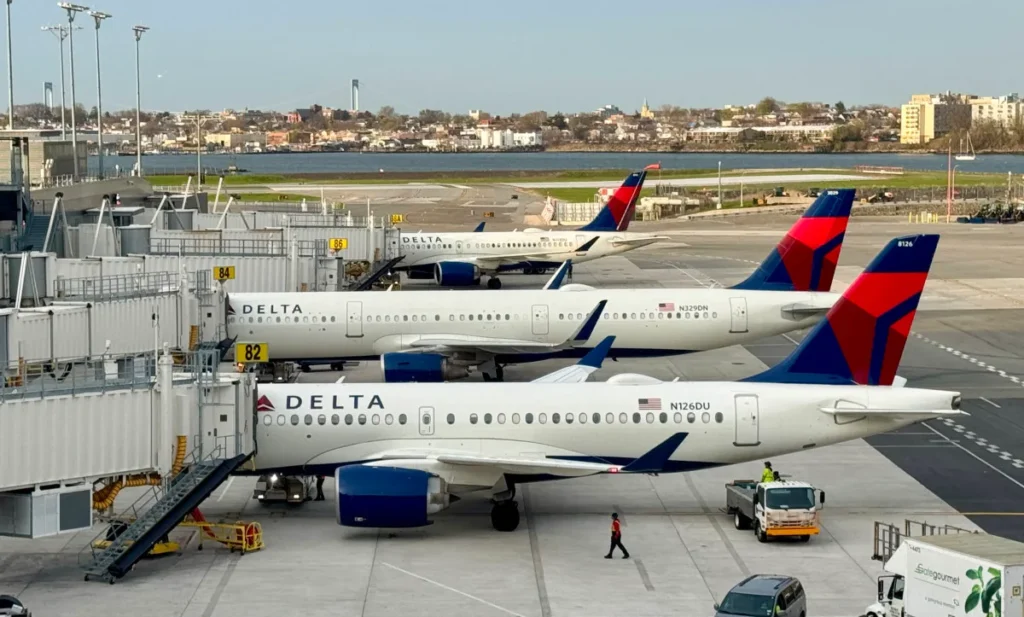Introduction
As the skies grew dark over Hartsfield-Jackson Atlanta International Airport in July 2025, few travelers could have imagined the mayhem on the verge of erupting. In a matter of hours, the world’s busiest airport had become the hub of enormous flight cancellations, stranded planes, and logistical horrors—all set off by a strong storm system that moved through Georgia. For Delta Airlines, whose main hub is Atlanta, the effect of the storm was not only substantial—it was historic.
In this in-depth guide, we cover all there is to know about the Delta Airlines Atlanta July 2025 flight cancellations. From why there were delays to what you can do if you’re impacted, this article provides you with actual answers during one of the peak travel seasons of the year.
What Caused the Delta Airlines Flight Cancellations in Atlanta in July 2025?
1. Severe Thunderstorms and Flash Flooding
Over the final weekend of June into July 2025, a cluster of severe thunderstorms dumped torrential rain, hail, and strong winds throughout the Southeastern United States. Atlanta, host to the country’s busiest airport, bore the worst of it. Flash flooding occurred on runways, necessitating emergency ground stops and evacuation of some air traffic control facilities for safety’s sake.
2. Hail Damage to Aircraft
The hail storm not only caused flight delays but physically harmed more than 100 airplanes, most of which were Delta Airlines planes. Structural damage was inflicted in dozens of planes, mostly on engines and fuselage parts, estimated early on. Safety inspections became the norm prior to any of these planes flying again.
3. Air Traffic Control Tower Evacuation
As lightning approached, segments of the air traffic control system were closed temporarily. Controllers were removed from towers for safety, leaving hundreds of incoming and outgoing flights in uncertain status. The FAA organized rerouting maneuvers, but delays and cancellations mounted rapidly.
Scope of Disruption at the Atlanta Hub
1. Widespread Grounding
By July 1, more than 1,000 Delta flights had been canceled, most of them originating in or going to Atlanta. Others were delayed for hours, and some were just abandoned. Airports from Charlotte to Chicago felt the effects.
2. Struggles of passengers
Long lines, packed terminals, and scarce hotel rooms made it challenging for stranded flyers to rebook or secure hotel stays. Numerous ones had to spend the night in terminals or wait for days for the next open seat.
3. Baggage Delays and Uncertainty
With the interruption to aircraft and crew, baggage tracking also became a priority concern. Scores of passengers reported missing, delayed, or diverted luggage. Delta made announcements assuring customers that their items would be found and delivered when operations resumed.
How Delta Airlines Handled the Crisis
1. Flexible Rebooking Policies
Delta offered fee-free flexible rebooking for all affected travelers. Flyers were able to reschedule flights online or using the Fly Delta app without penalties. The company also expedited rebooking for international travelers and families traveling with children.
2. Increased Customer Service Staffing
The airline sent extra customer service agents to the airport and support lines. Delta’s social media staff also offered immediate updates and responded to stranded travelers.
3. Technical Support Through the App
The Fly Delta app was utilized frequently throughout this time. It enabled passengers to view real-time flight statuses, receive digital boarding passes, handle rebookings, and get in touch directly with airline personnel.
4. Aircraft Inspection and Maintenance Boom
In order to hasten recovery, Delta summoned maintenance crews from other airports to service and fix hail-damaged aircraft. Technicians worked day and night to put planes back in the air while keeping safety standards strict.
Your Travel Rights and Options During Cancellations
1. Know Your Passenger Rights
U.S. laws mandate airlines to offer compensation under specific circumstances. If your flight is canceled or delayed for reasons within the control of the airline (not weather), you could receive meal vouchers, accommodation, and even cash compensation.
But in weather-related instances such as this one, there’s no assurance of compensation. Nevertheless, airlines are supposed to help passengers rebook and reroute.
2. Leverage Technology to Get Ahead
Apps such as:
- Fly Delta
- FlightAware
- TripIt Pro
can assist in monitoring delays, cancellations, and gate changes in real time. Turn on notifications to stay updated along your journey.
3. Keep Travel Insurance in Mind
If you had travel insurance or used a credit card that has coverage, you may be eligible for a refund on unused hotels, alternate transportation, or extra stay fees. Always check the fine print.
Lessons from Atlanta Storm Madness
1. Always Have an Alternative Plan
Weather disruptions become more frequent. Have a go-bag prepared with necessities like chargers, snacks, and travel documents. Identify the hotels around your airport in case you can book a room on a moments notice.
2. Take Early Flights
Early morning flights are less susceptible to being caught up in a domino of delays. They also have better recovery options if disruptions do occur.
3. Watch the Weather
Prior to departure, particularly in summer, look up weather forecasts at your point of departure and arrival. In case the weather appears hazardous, call the airline ahead of time and ask for rebooking.
Economic and Operational Impact to Delta
1. Aircraft Out of Service
With more than 100 planes in for inspection, Delta was forced to reschedule aircraft availability on its domestic and international routes. This resulted in changes in aircraft types among some routes and even route suspension.
2. Reimbursement Expenses and Loss of Revenue
Delta experienced substantial operational losses from:
- Waste of fuel on grounded flights
- Reimbursement for meals and hotel stays
- Logistics of rebooking
- Lost ticket revenues
Estimates by financial analysts put losses in the tens of millions. Nonetheless, the company valued safety and customer service over short-term returns.
Effect on Summer Travel Across the Country
1. Ripple Effect at All Airports
Key hubs such as New York (JFK), Chicago (ORD), Los Angeles (LAX), and Miami (MIA) saw knock-on delays owing to aircraft rotation issues and crew shortages.
2. Fourth of July Travel Crunch
As the July 4th holiday season neared, air travel demand increased. Delta re-considered flight availability and introduced recovery flights wherever it could. Customers were encouraged to travel off-peak days or drive where possible.
Traveler Testimonials
“I had a record number of people sleep in an airport all at once. Delta’s app assisted, but the crew were obviously overwhelmed.”
“I got meal vouchers and a hotel, but I missed a business meeting. At least the customer service representative was sympathetic.”
“It was frightening watching lightning strike as close to the runway as it did. I’m just glad safety took precedence.”
— Khalid, Atlanta student
What to Expect in the Future
1. Incremental Recovery
Delta has reinstated the majority of its services by early July, but passengers are encouraged to check flight information ahead of time. Delays from rebookings could still impact schedules for days.
2. Long-Term Fleet Adjustments
Delta will move faster to expand its fleet or replace hail-resistant material in aircraft bodies. The incident also highlighted the need for disaster readiness at major airports such as Atlanta.
Travelers’ Tips for July 2025 Flight
Get to the airport early (3 hours ahead for domestic, 4 for international)
- Don’t take connecting flights over storm-hit areas
- Carry luggage onboard to avoid loss of bags
- Have hard copies of hotel reservations and flight tickets
- Contact airline support early if problems arise
Conclusion
The Delta Airlines flight cancellations in Atlanta during July 2025 highlight the vulnerability of modern air travel to extreme weather. Yet, they also show the resilience of airline crews, airport staff, and travelers alike. While storms may be out of our control, preparation, patience, and clear communication can ease the burden.
While Delta and the airline industry regroup and rebuild, travelers can anticipate stronger backup plans and wiser technology to ride out the storm—both literally and metaphorically.
Taylor Swift: A Journey Through Music, Reinvention, and Cultural Impact



